Web3 AI Agents Explained: How Intelligent On-Chain Systems Work
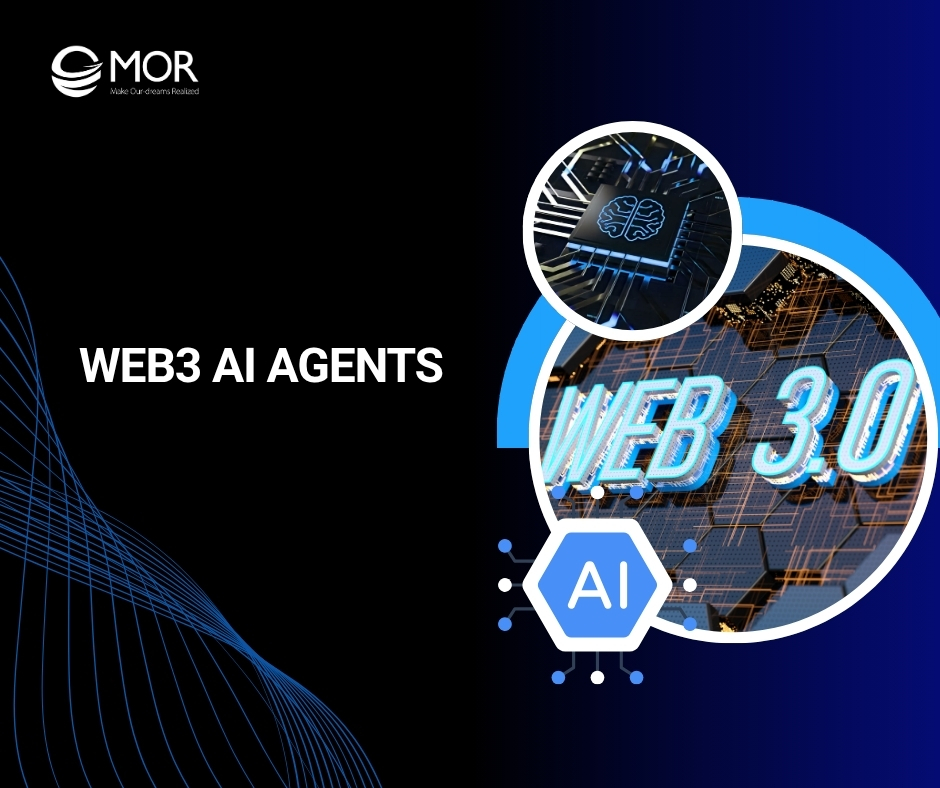
Web3 AI agents are gaining attention as teams search for smarter, faster, and safer ways to run decentralized platforms. These systems deliver clear value across finance, data processing, and automation inside the growing AI Web3 ecosystem. In this guide, MOR Software will explain how these intelligent agents work and why they have become an important part of modern Web3 development.
What Are Web3 AI Agents?
Web3 AI agents are intelligent digital programs that can act on their own with support from real time and past data. In this setting, these agents collect information, review it, and make choices based on clear goals. This process often uses machine learning and deep learning. As AI Web3 technology grows, these autonomous systems have become easier to use and far more advanced.
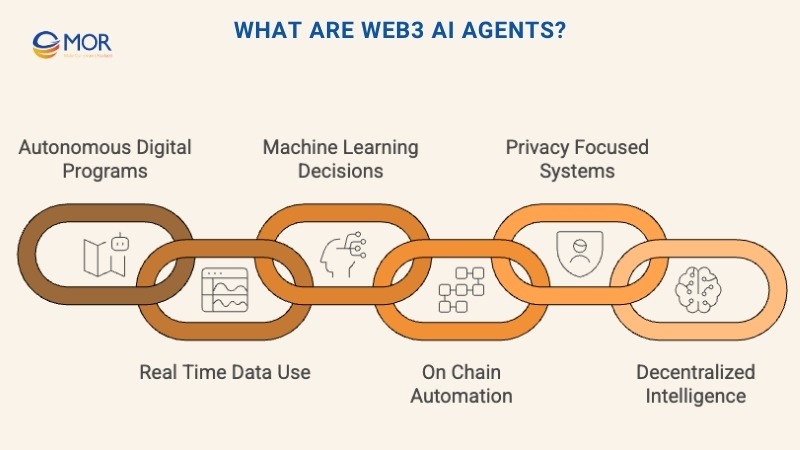
They rely on trained models to guide actions and carry out automation, and they now play an important role inside blockchain networks. They give real time insights, share market signals, and deliver useful details to different types of users. Through modern learning methods, they improve how well they can predict trends or understand changing activity.
They also cut daily costs through automated work and support new ways to earn from AI services inside decentralized marketplaces. Privacy protection is a strong part of these systems, and they function without a central authority, which fits the vision of AI and blockchain design. As the field grows, these agents keep gaining new skills at a steady pace.
In this AI in Web3 environment, they connect with blockchain networks and carry out actions such as:
- Carrying out trades across different DEX platforms
- Using AI models to guide decisions and manage workflow automation
- Studying market activity to spot patterns or possible openings
- Reviewing price charts to shape trading plans
- Applying natural language tools to understand unstructured content
- Running sentiment checks to follow changes in social media and news
- Supporting decentralized governance inside DAOs
- Applying governance rules that promote open and clear decisions
- Handling investment plans with the help of smart insights
- Checking blockchain security for possible risks or harmful activity
- Tracking blockchain trends to stay current with shifting market signals
- Acting as independent agents that manage different digital assets
- Connecting with Freysa AI as a system built to feel more human-like
- Using Ocean Protocol to support secure and open data sharing
They usually work through smart contract calls, REST or gRPC requests, or built-in scripting layers inside blockchain platforms.
Web3 AI Agents Market Overview
The market for Web3 AI agents is growing at a fast pace as more teams adopt artificial intelligence and machine learning inside decentralized networks. These autonomous tools can review data, make decisions, and act on their own without human input. This trend shows how strong AI has become inside the wider Web3 AI crypto space, where new systems help manage tasks across different chains. Many groups now rely on improved models to support real time decisions, help with trading, and keep blockchain activity running smoothly. These changes connect well with the rise of AI crypto projects, which shows how active this space has become.
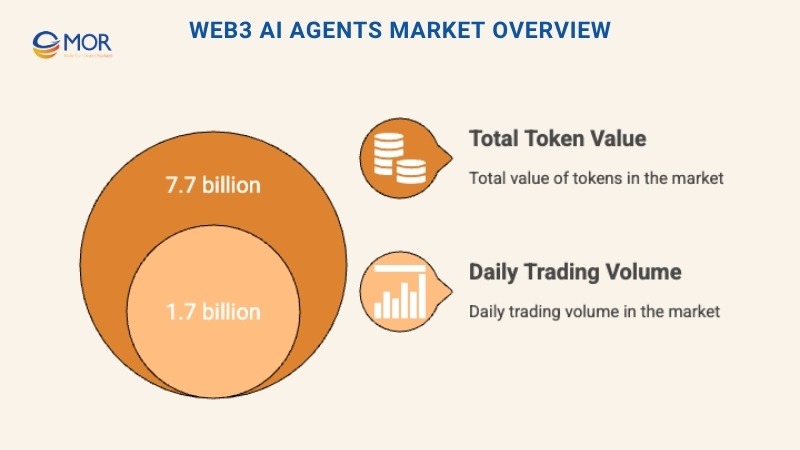
The total value of tokens linked to these agents has already climbed past 7.7 billion dollars, and daily volumes near 1.7 billion dollars. This activity reflects strong interest from users and builders. Projects like Virtuals Protocol, Fetch.ai, and SingularityNET lead this movement and keep pushing fresh ideas into the market. Their platforms improve how decentralized applications work, help raise trust in on-chain actions, and shape better automated systems. This part of the market also continues to attract attention from investors who follow trends tied to AI bitcoins and similar assets that mix smart models with blockchain tools.
As newer tokens and platforms appear, the wider ecosystem is ready for a major shift in how teams study data, run trading activity, and create decentralized applications. This progress shows a tight link between artificial intelligence and modern blockchain networks. The mix of both fields opens more creative paths for users and developers, and it highlights how fast Web3 AI agents are moving toward a bigger role in future systems.
How Do Web3 AI Agents Typically Work?
Here is a simple view of how Web3 AI agents usually operate:
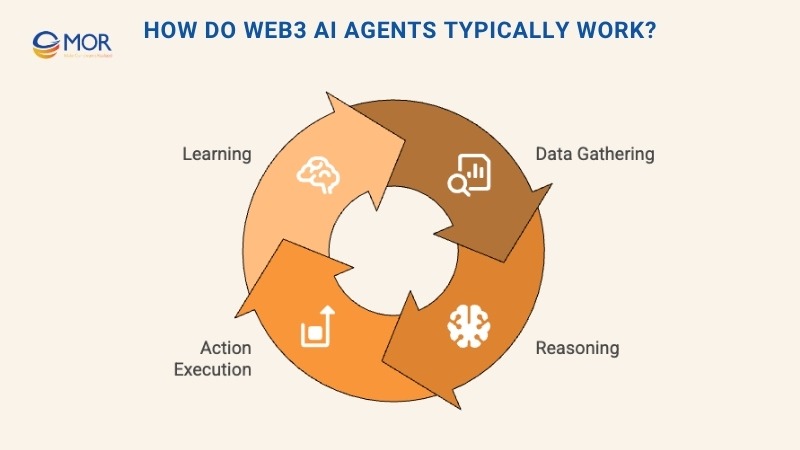
- Data gathering and sensing: The agent watches on-chain activity like wallet levels and recent transactions. It also checks outside sources such as news, social channels, and market updates, along with smart contract signals. A common AI crypto app in this space might read token prices, review liquidity, or check the state of a contract.
- Reasoning and decision making: With help from AI models or clear rule sets, the agent reviews the data, spots chances or unusual patterns, and chooses the next step. It may decide when to switch tokens, when to send an alert, or when to start a workflow.
- Action and execution: The agent moves ahead with the action. It may start a smart contract call, complete a token swap, stake or withdraw assets, send messages, or manage a governance vote. It needs to work safely with wallets, gas costs, and security requirements. Some systems in this area even link to an AI coin generator for more automatic tasks on-chain.
- Learning and feedback: Many agents use ongoing feedback to guide future decisions. They adapt their approach, improve results, and follow better patterns over time. This environment can also include rewards and reputation features that support steady growth in how the agent behaves.
Why Do Businesses Integrate AI Agents In Web3?
The use of Web3 AI agents is changing the way people interact with decentralized platforms. Many companies now see this technology as a key part of staying competitive in the blockchain space. These agents help create smoother, smarter, and more helpful experiences for users, which supports the wider growth of AI and Web3 solutions. With AI-driven automation reshaping finance and Web3, this approach has become even more valuable for teams that want better speed, accuracy, and user support.
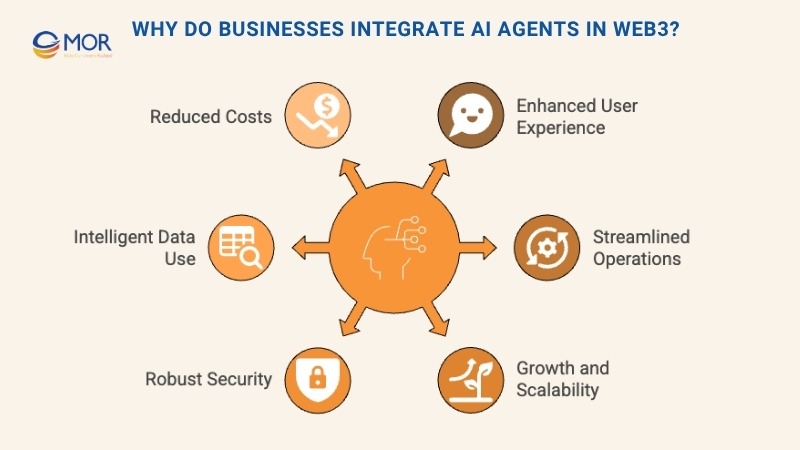
1. Better User Experience
Strong user experience is important for any platform, and these agents raise the quality of interaction inside Web3 applications. They rely on modern algorithms and language tools that help them understand user habits, needs, and personal interests.
For example:
- In a DeFi platform, an agent can look at past activity and share ideas that match a user’s goals or warn them about sudden market changes.
- Inside NFT markets, agents can help users find items that match their taste, which saves time and makes the browsing process more enjoyable.
Through real time support and personal suggestions, this solution makes Web3 apps easier for everyone, including users who do not have deep technical knowledge. This improvement builds trust and encourages people to return, which is important in a fast and competitive market.
2. Smoother Operations
Running decentralized platforms often includes many routine tasks like checking transactions, replying to common questions, or carrying out smart contract actions. Web3 AI agents help handle these tasks with steady accuracy and quick response times.
- They can watch blockchain activity at all hours and point out any strange behavior or possible errors without needing a person to step in.
- Support tasks, including simple questions or basic troubleshooting, can be managed by these agents, which leads to faster replies and happier users.
For companies that build or maintain blockchain solutions, this kind of automation helps lower daily costs and speeds up project delivery. It also gives human teams more time to work on long term plans, new ideas, and growth efforts.
3. Growth And Scalability
As more people use Web3 platforms, these systems must grow without losing speed or quality. Web3 AI agents can support this growth because they can manage a high number of actions at the same time.
- They can process large numbers of transactions each second or handle questions from millions of users while keeping performance steady.
- While human teams need extra staff to keep up with rising demand, these agents can expand their workload smoothly with very little extra setup.
This kind of scaling is helpful for businesses that want to enter the Web3 market. It lets them welcome more users without facing delays or service breaks that could slow their progress.
4. Stronger Security Protections
Security is one of the most important parts of any Web3 platform because everything runs in a decentralized environment. Mistakes or weak points can cause major financial loss or harm a brand’s reputation. Web3 AI agents act like active security guards that watch network activity at all times. They look for unusual actions or signs of danger, such as sudden spikes in transactions or attempts to access accounts without permission.
- They can quickly flag or stop actions that look dishonest, which helps shield users from scams or attacks.
In a DeFi system, an agent can spot strange changes inside liquidity pools or catch flash loan activity in real time. This early detection protects the platform and strengthens user trust in the safety of the service.
5. Smarter Data Use
Web3 platforms create huge amounts of data from user activity, transactions, and market movement. This information is valuable, but turning it into clear guidance can be difficult without strong tools. Web3 AI agents are effective at handling this kind of work.
- They study large datasets in real time to find patterns, trends, and new chances for growth.
- They share useful insights that help teams improve their products or adjust daily operations.
For instance:
- Inside a DEX, an agent can read market signals and point out trading pairs that may bring better results.
- In a DAO, it can study how members vote or how the community feels about a topic, which helps shape sound decisions.
With support from these insights and a capable partner in AI and crypto, businesses can plan smarter steps, improve performance, and stay ahead of rivals in a fast-moving market.
6. Lower Operating Costs
Many startups and smaller teams entering the Web3 field have limited budgets. Building large support groups for tasks like user assistance, security checks, or deep data review can take a lot of time and money. Web3 AI agents offer a practical way to manage these tasks without heavy spending.
- They can take over complex activities that would normally need a big human team.
- They also help cut mistakes caused by manual work, which lowers the chance of daily risks.
For example:
- A new NFT marketplace can use an agent to answer questions about wallet setup or minting steps instead of hiring a full customer support team.
- In a DeFi system, an agent can watch over a user’s portfolio and guide better choices without needing financial experts on staff.
- This approach helps teams use their budgets wisely while keeping strong performance and steady reliability.
When businesses use these agents inside the Web3 environment, they improve how their platforms work and step forward as early adopters of smart tools in the decentralized space. These systems support better user experiences and smoother operations, which brings clear benefits to both companies and their communities.
Key Use Cases Of Web3 AI Agents
Web3 AI agents play many roles across real time trading, community management, security, and automation. The examples below highlight where these intelligent systems bring the most value in day to day Web3 operations.
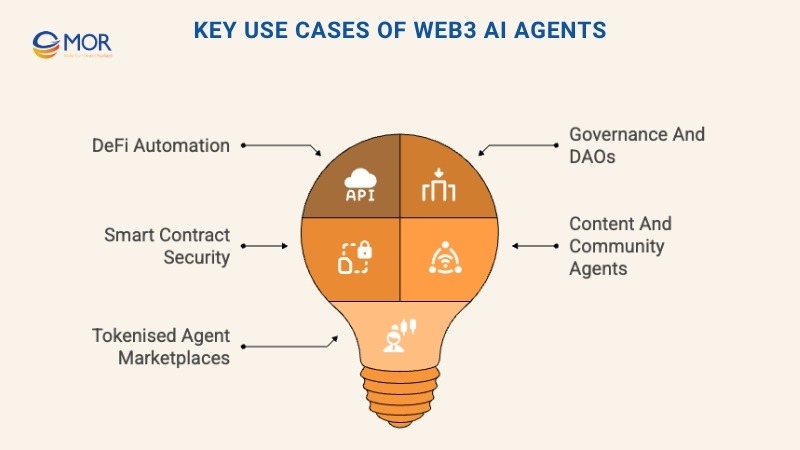
DeFi Automation
Web3 AI agents can follow liquidity pools, lending rates, token values, and smart contract signals in real time. They react much faster than human traders and can handle detailed DeFi plans on their own. An agent may move funds from a lending pool with a lower APY to another protocol with stronger returns or carry out a swap as soon as slippage reaches a set level.
A clear example is a yield tool that compounds rewards on platforms like Aave or Curve and shifts assets whenever it finds a more promising chance.
Governance And DAOs
Decentralized groups often depend on steady community activity, yet participation can rise and fall. Web3 AI agents can read proposals, shorten long documents, compare older voting results, and share suggestions based on clear rules. They also support tasks like casting votes on schedule, tracking quorum progress, or informing members when a key proposal is posted.
A useful example is a governance helper inside a DAO that checks upcoming votes, points out possible concerns, and submits a vote that matches the member’s chosen preferences.
Smart Contract Auditing And Security
Security is still a key issue in Web3, and Web3 AI agents can strengthen this area by checking contract code, spotting unusual activity on the chain, and sending alerts in real time. They can catch patterns that often point to attacks, such as quick liquidity drains or strange token minting activity. Some advanced tools can even start emergency steps when a threat becomes clear.
A simple example is a security agent watching a DeFi protocol’s liquidity pools. When it sees a suspicious set of flash loan actions, it can warn the team or activate a safety switch.
Content And Community Agents
Projects built around NFTs, games, or metaverse worlds need steady interaction to keep users involved. Web3 AI agents can welcome new members, guide conversations, prepare short summaries, and share updates with the help of real time on chain data. They can also create simple posts, highlight popular items, or support users as they explore a collection.
A clear example is a metaverse guide that talks with players, shows them how to mint an item, suggests quests, and pulls ownership details for digital assets.
Tokenised Agent Marketplaces
Some platforms now let creators build agents that function as digital assets inside the Web3 AI agents ecosystem. These agents hold their own wallets, identities, and roles that users can buy, upgrade, or rent. Because ownership stays on chain, creators can earn from activity linked to these assets. This space also connects well with AI and crypto, since both fields support new ways to trade and use digital tools.
A simple example is a trading agent on a marketplace like Virtuals that focuses on meme coin trading habits. A user can purchase the agent, adjust how it behaves, and earn income from its results or sell it again later.
Types Of AI Agents Emerging In Web3
Different categories of agents are starting to take shape as Web3 technology grows. Each type focuses on a specific role, helping platforms run more smoothly and giving users better support.
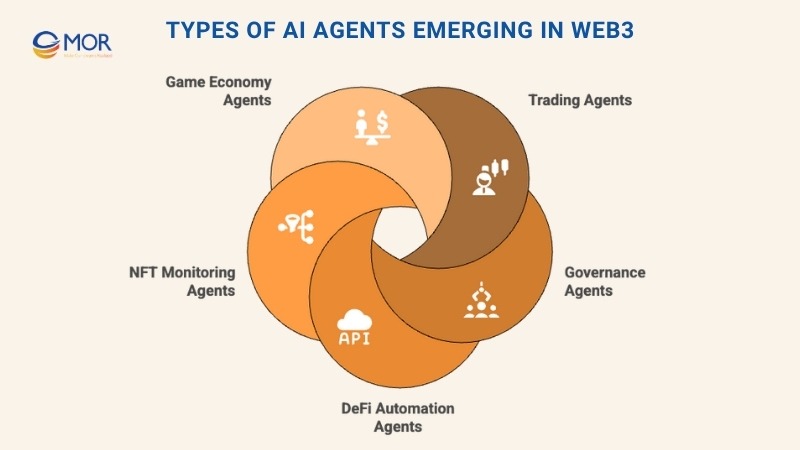
1. Trading Agents
Trading agents watch token prices, study market data and price charts, and carry out orders across many chains and DEXs. They support trading and give real time insights through constant reading of blockchain and market activity. These agents also share useful market signals and help guide investment plans for better results. This group is a core part of the wider Web3 AI ecosystem as more tools support smarter trading tasks.
2. Governance Agents
Governance agents can vote for users in DAOs based on personal settings, on chain reputation, or clear rule sets. They help apply different governance methods inside blockchain systems. These agents work on their own without a central authority, which supports open and scalable decision making.
3. DeFi Automation Agents
These agents rebalance liquidity, auto compound rewards, or carry out liquidation steps on lending platforms. DeFi automation agents use AI tools and machine learning to improve these strategies, which leads to smarter and more informed actions. As they take over complex work, these agents help lower daily costs and raise overall efficiency for users and platform operators.
4. NFT Monitoring Agents
These agents alert users about new listings, mint events, or rare item opportunities in real time. NFT monitoring agents share timely insights and important updates by studying blockchain activity and market signals. Many of them use language tools and basic sentiment checks to follow how communities feel about different NFT projects, helping users stay aware of changes in the market.
5. Game Economy Agents
These agents manage assets, quests, and yield plans inside on chain games and metaverse worlds. Game economy agents work on their own and use deep learning and AI models to handle complex in game systems and keep virtual economies running smoothly.
Top 10 Web3 AI Agents To Know In 2025
The Web3 space now includes a wide range of agent driven projects, each offering its own approach to automation and intelligence. The list below highlights the ten standout options that are gaining the most attention in 2025.
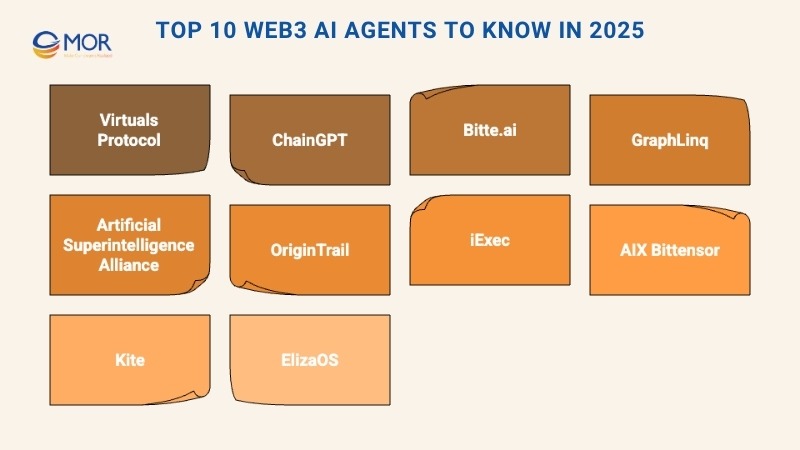
Top 10 Web3 AI Agents To Know In 2025
Web3 AI Agents | Quick description | Key strengths | Things to watch | |
| 1 | Virtuals Protocol (token: VIRTUAL) | A launch platform for tokenised agents that can hold wallets, provide services, and trade on chain. | Creative agent as asset model, strong token setup, and simple agent creation tools. | Many agent services are still early, and there is a chance of hype driven trading. |
| 2 | ChainGPT (AI Agents ecosystem) | A broad agent ecosystem that supports news writing, alerts, and SDKs for developers working in Web3. | Solid tools for builders and strong support for crypto focused insights. | Not yet a fully autonomous on chain agent system, with several human steps still involved. |
| 3 | Bitte.ai | A no code builder that lets users create agents able to send and run EVM transactions. | Very helpful for adding agent functions into on chain workflows. | Must manage transaction safety, and fewer consumer style use cases are available. |
| 4 | GraphLinq | Web3 tooling that includes agent style features like crypto Twitter automation and DeFi workflows. | Good link between Web3 tools and automation tasks for agents. | Still more suited for niche use cases and not a full agent marketplace. |
| 5 | Artificial Superintelligence Alliance (token: FET) | One of the leading agent related tokens by market cap. | Strong market listing and strong visibility within the underserved niches in Web3 and AI digital marketing 2025 space. | Token movement may grow faster than actual product maturity. |
| 6 | OriginTrail (token: TRAC) | A project listed under agent tokens on major tracking sites. | Established project with wide usage across different fields. | More focused on data and network layers than on direct agent functions. |
| 7 | iExec (token: RLC) | A decentralized compute network included in agent token lists. | Strong compute base needed for many Web3 AI agents. | Not a dedicated agent marketplace or builder at this stage. |
| 8 | AIX Bittensor (token: AIXBT) | A platform that mixes blockchain with AI sub networks and appears in agent categories. | Interesting design for decentralised agent training. | Still very early, with large plans and high complexity. |
| 9 | Kite (token: KITE) | A token placed in agent categories on market cap platforms. | Shows the wide range of agent related tokens. | More speculative value than direct product usage in many cases. |
| 10 | ElizaOS (token: ELIZAOS) | Another token listed inside the AI agent category. | Adds more options and variety to the ecosystem. | Similar risk where branding may grow faster than real product progress. |
Challenges And Considerations For Web3 AI Agents
Even with strong potential, this field comes with real risks and limits that teams need to understand, especially as Web3 AI agents continue to grow in use. Some of these areas also connect to underserved niches in digital marketing for Web3 and AI, where tools and standards are still developing.
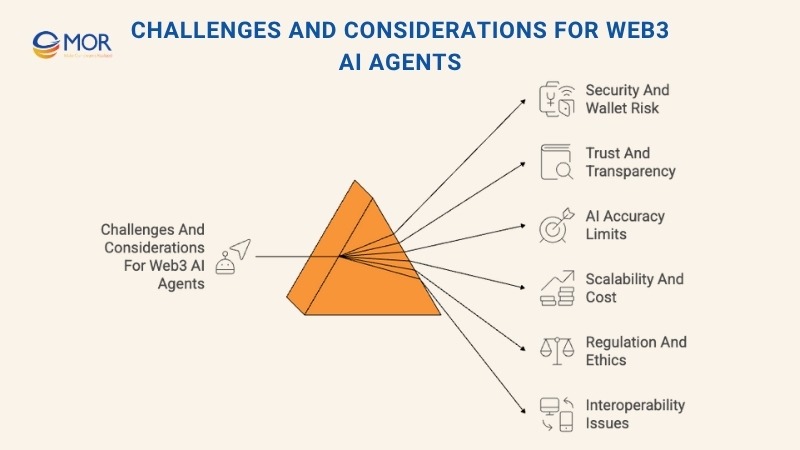
- Security and wallet risk: These agents handle real digital assets like crypto and tokens. A bug or attack can create serious losses. Strong protection, careful design, and safe key management are necessary.
- Trust, transparency, and governance: When agents act on their own, it becomes harder to check if they follow the intended rules. Decentralized systems must support clear audits and full accountability.
- AI accuracy and reliability: Agents need to avoid errors or unexpected actions. Mistakes have greater impact in Web3 because most on chain actions cannot be undone.
- Scalability and cost: On chain activity comes with gas fees, network delays, and other limits. Real time decision making can slow down when chain load is high.
- Regulation and ethics: When agents automate trading, produce content, or take financial actions, they may fall under new regulatory rules. Token rewards, DAOs, and reputation tools also raise questions about fair governance.
- Interoperability: The Web3 world uses many chains and tools. Building agents that work across several networks or protocols can still be challenging.
Future Outlook For Web3 AI Agents
Looking forward, the path ahead for Web3 AI agents appears very promising, with strong room for growth and new ideas. As artificial intelligence and machine learning continue to improve, these agents will gain the ability to manage more complex tasks and make faster, smarter decisions in real time. This progress will expand how teams use these systems across different blockchain environments, including wider areas of AI in blockchain where intelligence and automation come together.
The mix of these agents with other advanced technologies like blockchain, IoT, and decentralized intelligence will open new doors for automation, data work, and smart system design. This combination will help create decentralized applications that respond more quickly to changing markets and shifting user needs.
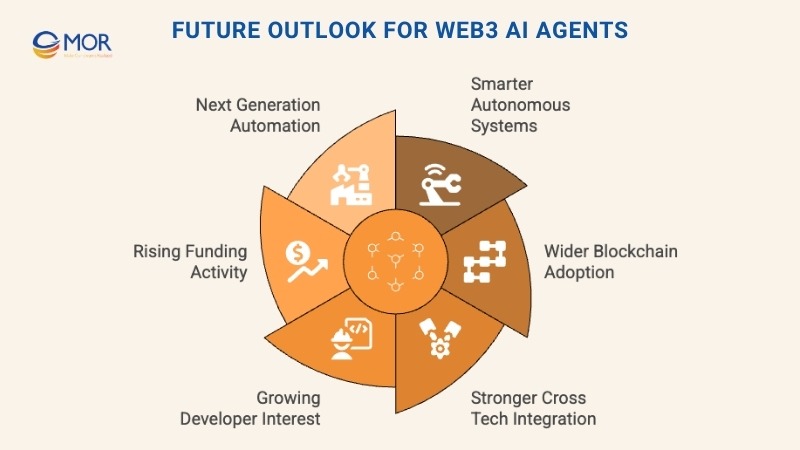
As more people adopt these tools, funding in agent development will likely rise. This shift will attract data experts, developers, and larger investors who want to take part in the next stage of autonomous systems. The steady improvement of AI powered tools and agent platforms will shape the future of the crypto world. Users will gain clearer insights, make stronger decisions, and take part in decentralized systems with more confidence.
The next generation of these agents will push the limits of what blockchain technology can achieve, making this an exciting area for anyone watching the growth of artificial intelligence inside Web3.
Why Choose MOR Software for Web3 AI Agents Development
MOR Software brings together deep experience in AI engineering, blockchain development, and large scale system design, making us a strong partner for businesses exploring Web3 AI agents. Our teams build custom agents for trading, governance, DeFi automation, NFT analytics, and game economies, all backed by secure smart contract interactions and reliable data pipelines.
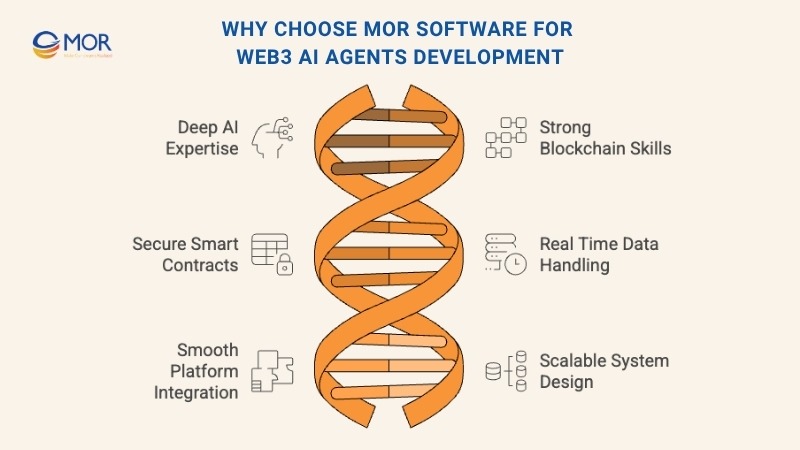
We design systems that let agents operate safely in real time, from handling wallet transactions to processing on chain data flows. Our engineers also integrate these agents into existing DApps and enterprise platforms, creating smooth user experiences without disrupting current operations.
With mature delivery processes and a strong focus on security, scalability, and long term support, MOR Software helps companies deploy Web3 AI agents with confidence. Whether the goal is automation, better decision making, or new blockchain powered products, we provide the technical foundation needed to build solutions that are stable and ready for growth.
Conclusion
Web3 AI agents are shaping the next stage of decentralized technology, giving businesses faster decisions, stronger automation, and smarter data use. As more teams explore AI in Web3, the demand for secure and scalable solutions will continue to rise. MOR Software supports this shift with reliable engineering and real time system design. If your business is ready to build or expand with intelligent on chain agents, contact us to start your next Web3 project with confidence.
Rate this article
0
over 5.0 based on 0 reviews
Your rating on this news:
Name
*Email
*Write your comment
*Send your comment
1